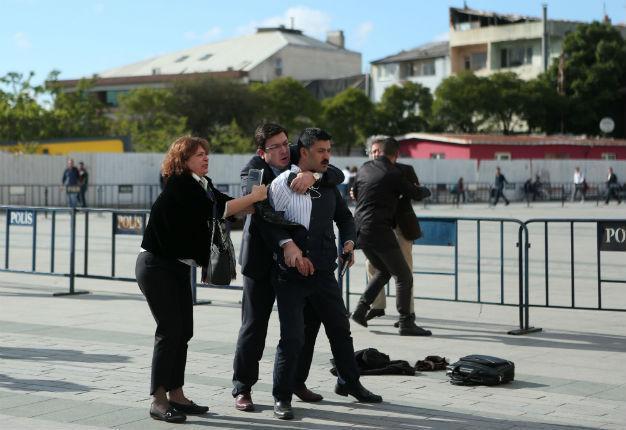Police expand investigation in Dündar attack as details emerge
ISTANBUL

This picture released by daily Cumhuriyet shows Dilek Dündar (L), the wife of Cumhuriyet editor-in-chief Can Dündar, trying to stop a gunman as Can Dündar (R) is protected by another man on May 6, 2016 in Istanbul. AFP photo
The investigation into the failed armed attack targeting daily Cumhuriyet editor-in-chief Can Dündar in front of an Istanbul courthouse on May 6 has been expanded, with the Istanbul Police Department’s intelligence bureau, anti-terror bureau and public security bureau initiating an extensive search surrounding the main suspect of the attack and two others who were detained for their alleged role in it.Murat Şahin, the main suspect in the attack, and two other suspects were given three extra days of detention time, while police teams were set to examine the cell phone signals, text messages and telephone conversations of the suspects, as wide-scale interrogations were also going to be conducted.
Şahin, who attempted to shoot Dündar outside of an Istanbul courthouse on May 6, claimed he carried out the act independently and “wanted to teach Dündar a lesson” as he “did not like him,” security sources said, after detaining the 40-year-old following the failed attempt.
“If I wanted to kill him, I would [have] but I shot at his leg to scare him,” Şahin reportedly said.
Şahin, who was born in 1976 in Istanbul and registered in the Central Anatolian province of Sivas, approached Dündar as he was speaking to reporters during a break in the journalist’s trial on May 6. After firing two shots at Dündar’s legs while saying, “You are a traitor,” Şahin was immediately subdued by Dündar’s wife, Dilek Dündar, and a main opposition Republican People’s Party (CHP) lawmaker Muharrem Erkek before police intervened. However, Yağız Şenkal, a reporter for private broadcaster NTV, was wounded in the leg during the attack.
As Şahin was detained an extra 24 hours, two more suspects were detained on May 7 over the attack. According to the Istanbul Police Department, the suspects were reported to be associates of the gunman.
Searching the records of the surveillance cameras around the courthouse, police learned Şahin had arrived at the scene at 9:00 a.m. and waited until 5:20 p.m. to carry out the attack. Police added that one of the two other suspects had been following Dündar and called Şahin as the journalist went outside to take his break to give a green light for the attack.
Police were continuing the extensive investigation over the attack, as 20 people from the assailant’s circle were interrogated, including Şahin’s wife, while inspectors were trying to determine where Şahin got the weapon he used in the attack.
Dündar was also provided with a special three-person guard team from the Istanbul Police Department, in addition to his previous guard, who was one of the officers who intervened in the incident.
Meanwhile, security sources also claimed Dündar may have been a target of the Islamic State of Iraq and the Levant (ISIL), as police learned the journalist’s house had been searched by a militant from the group’s cell in the southeastern province of Gaziantep.
According to the sources, Dündar’s home address had been searched on a cell phone belonging to Hüseyin Kara, whose name previously appeared in police records as allegedly being one of the two militants from the group’s cell in Gaziantep who gave the order for the deadly March 19 attack near Istanbul’s Taksim Square. Upon the intelligence, Dündar was provided with an additional guard.
Dündar, along with Cumhuriyet’s Ankara bureau chief, Erdem Gül, were on trial for “leaking state secrets” due to stories published about Turkish intelligence trucks allegedly bound for Syria with hidden weapons in early 2014. After their final trial on May 6, the Dündar and Gül were convicted by an Istanbul court and sentenced to five years and 10 months and five years in prison, respectively.
















